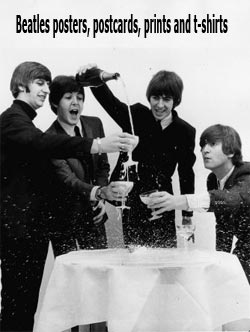 |
| There WILL BE a 50th anniversary edition of The Beatles' "White album", Paul has confirmed. |
But the rumours have been floating in such a manner that it's not strange if the interviewer Lisa Wright really thought that the anniversary edition of "the white album" was a sure thing. As early as amidst the hoopla last year just before the 50th anniversary "Sgt Pepper's Lonely Hearts Club Band", remixing producer Giles Martin tweeted and talked in a radio programme about doing "the next one". Following a storm of re-tweets and questions, Martin had to make a statement that he hadn't actually meant to confirm that there was going to be an anniversary "white album" release. Then this May, mastering engineer Tim Young happened to mention to someone that had just finished mastering the Beatles' "White Album" in 5.1 surround sound as well as in stereo at Metropolis Mastering in London. But still, that was "off the record", until now.
But back to the McCartney interview, he actually also seemed to confirm that at least some Kinfauns demos may be part of the package:
"Are there any moments you’d forgotten about when you were trawling back through the archives"?
"Something sparks another memory, but it’s really nice because we were a great little band – I think we can agree on that. So for me to be a part of that and to be remembering it is great; all these little things remind me of it and I do learn things".
"The album itself [‘The White Album’] is very cool and it sounds like you’re in the room; that’s the great thing about doing remasters. But we’ve also got some demos of the songs, so you get things stripped right back to just John’s voice and a guitar. You just think, how f***ing good was John?! Amazing. We were just doing it; it was amazing. We were having a good time".
The full interview can be found here.
 |
| Recording "Honey Pie". |
Someone else who didn't want to be part of the white album sessions was The Beatles' engineer, Geoff Emerick. Having started engineering for the band on "Revolver" and then working on "Sgt Pepper's Lonely Hearts Club Band" (which he later was awarded a Grammy for), Emerick already abandoned them during the recording of songs for "Magical Mystery Tour", and Ken Scott took his place. Scott actually made his debut as a recording engineer during "Your Mother Should Know", and had to figure out what all the knobs, meters, levers and wheels on the recording console did to the sound. But by the time the white album sessions started, Scott had learned his trade, and had already worked on the "Wonderwall Music" album with George Harrison - the Beatle he would remain the closest to.
We had a chance to hear Scott talk about the white album sessions when he visited Oslo earlier this summer. Surprisingly, Scott also remembered the sessions as "a good time", and said that after Ringo's return, The Beatles were back to being a group again - and fed off each other in a big way during these sessions. This is quite contrary to the popular belief that these sessions were fragmented, and that not many members of the group were together in the studio at the same time. On the contrary, Scott says, they recorded songs as a band - much more so than during the Sgt Pepper recording sessions. It was only when they were approaching deadline for delivering the new album that they split up work between them and started recording on their own in separate studios, Scott maintains. And it only became a double album when they realised how much material they had. There was no way they would be able to wither it down to "one super single album".
 |
| Ken Scott holding the "Norwegian Wood" magazine, alongside Roger Stormo. Photo: Audun Molde. |
Now that "the secret" is out, perhaps Giles Martin and others are more free to comment on the upcoming release (most likely slated for November 9), although they are probably instructed to keep quiet until the press brief, currently slated for September.
As you may or may not know, there was a 30th anniversary edition of The Beatles' "white album" back in 1998.
 |
| The 30th anniversary white album release was a limited edition. |
When the catalogue got a makeover for the remastered CDs of 2009, the sound was improved, and the packaging pretty much replicated the 30th anniversary edition. The remastering project for both mono and stereo versions was led by EMI senior studio engineers Allan Rouse and Guy Massey.
As mixing for stereo had made much improvement by 1968, there really hasn't been much demand for a new edition "white album" remixed in "new" stereo, and we don't know if this is Giles Martin's approach. What we do know, is that stereo and surround mastering has taken place. Whether or not this is "new" stereo or if the stereo image has remained the same is anyone's guess, until this kind of information is revealed. And nothing has been said about mono this time. Still, Paul's mention of essays and demos do point to a comprehensive boxed set. And if this keeps up, perhaps we'll even see a Let It Be boxed set in 2020, which includes the film? Keep dreaming...































6 comments:
Fab!
Twist and Shout !
Let's hope so... por a Let It Be Box Set... meanwhile, continue to save money for this one (just like with Pepper....) Greetings from a mexican beatle Fan in Madrid
It’s going to be great. My favourite album of all time.
In SGT. Pepper's case the gist was not only to improve the stereo picture but also to get rid of the decreased fidelity when the four track tapes were bounced down to another four track tape to get more free tracks. So the the mix is better and also the sound quality is better. So in the White album case even if the stereo separation does not need improvement, the overall sound qualitu of the double album could be made better by remixing the album from the original multitracks with modern technology.
The Beatles at 50: http://stevepafford.com/beatles68/
Post a Comment